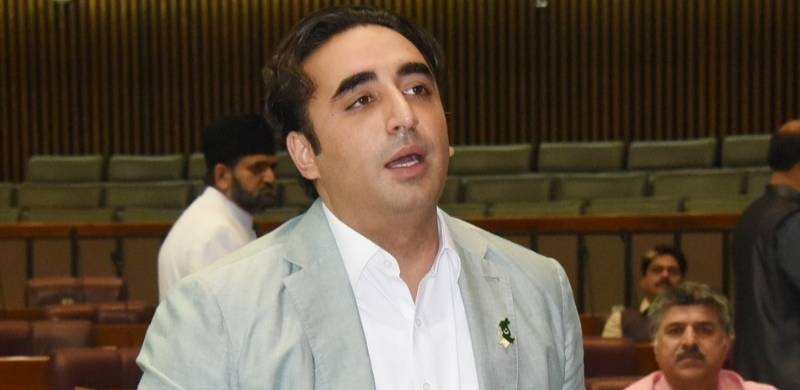
Foreign Minister Bilawal Bhutto has claimed that the night before voting on the no-confidence motion against former prime minister Imran Khan, a then minister from the Pakistan Tehreek-e-Insaf (PTI) government had threatened him to either agree to early elections, or prepare for martial law.
He made these remarks while addressing the National Assembly on Thursday.
Bilawal said that the PTI minister's threat was delivered to him through a colleague. "I would like to share with this house that the night before the no-confidence motion was passed, I was sent a message, a threat that either we accept early elections or face martial law," he said.
He said that the threat was an intimidation tactic by the PTI, and an attempt to deride the no-confidence motion against Imran Khan, which despite their best efforts, still ended up being successful.
Bilawal also said that PTI was still intent on creating political instability and making reckless attacks so that they could engineer one of two results: either early elections without reforms, or an undemocratic step as in the case of martial law.
"We should all make efforts to foil this conspiracy. We will all have to come together and work hard to foil this conspiracy and save the country."
The foreign minister said that the incumbent coalition government of the Pakistan Peoples Party (PPP) and the Pakistan Muslim League-Nawaz (PML-N) was a firm believer in democracy and transparent elections.
He echoed the statement given by his father Asif Ali Zardari, and said that electoral reforms were the need of the hour, and a clear part of the PPP's stance on the way forward. "First reforms, then elections. This has always been our position," he declared.
The minister also called for a 'high-level' investigation into the events that transpired before and after the passing of the no-confidence motion.
"This house must form a high-level parliamentary commission or committee to investigate the events leading up to April 3, post-April 3, of the night of April 9 and 10, and the events that have taken place to date after," Bilawal said.
He made these remarks while addressing the National Assembly on Thursday.
Bilawal said that the PTI minister's threat was delivered to him through a colleague. "I would like to share with this house that the night before the no-confidence motion was passed, I was sent a message, a threat that either we accept early elections or face martial law," he said.
He said that the threat was an intimidation tactic by the PTI, and an attempt to deride the no-confidence motion against Imran Khan, which despite their best efforts, still ended up being successful.
Bilawal also said that PTI was still intent on creating political instability and making reckless attacks so that they could engineer one of two results: either early elections without reforms, or an undemocratic step as in the case of martial law.
"We should all make efforts to foil this conspiracy. We will all have to come together and work hard to foil this conspiracy and save the country."
The foreign minister said that the incumbent coalition government of the Pakistan Peoples Party (PPP) and the Pakistan Muslim League-Nawaz (PML-N) was a firm believer in democracy and transparent elections.
He echoed the statement given by his father Asif Ali Zardari, and said that electoral reforms were the need of the hour, and a clear part of the PPP's stance on the way forward. "First reforms, then elections. This has always been our position," he declared.
The minister also called for a 'high-level' investigation into the events that transpired before and after the passing of the no-confidence motion.
"This house must form a high-level parliamentary commission or committee to investigate the events leading up to April 3, post-April 3, of the night of April 9 and 10, and the events that have taken place to date after," Bilawal said.

